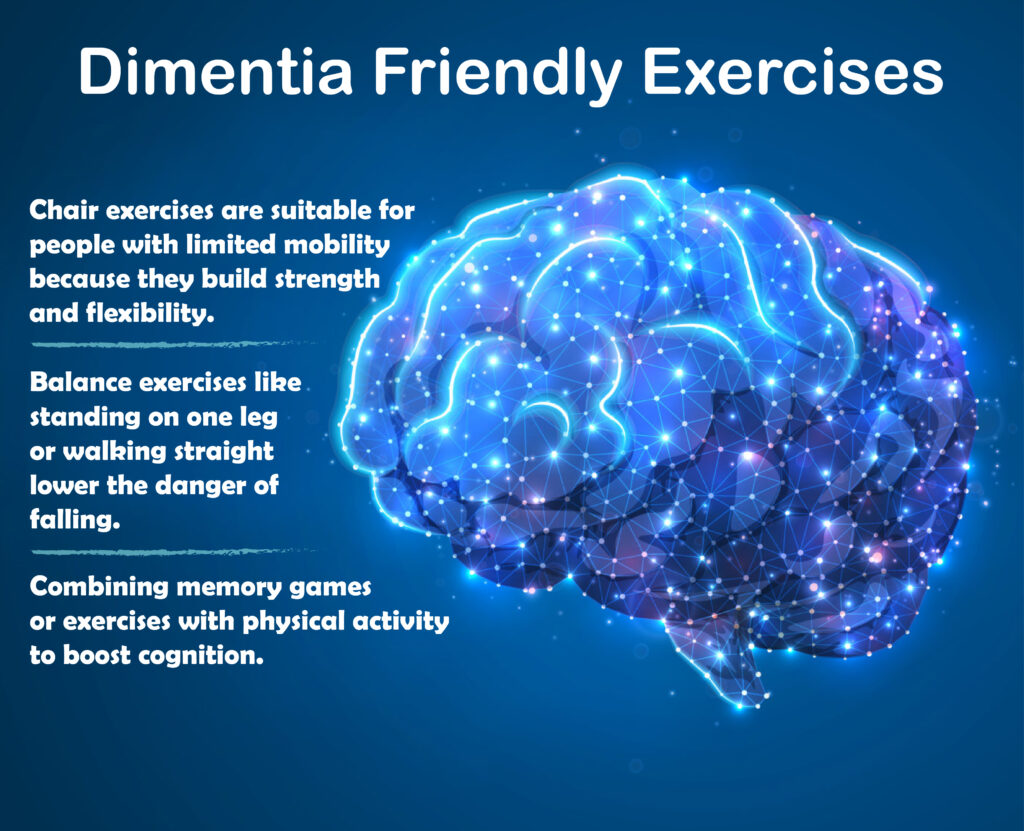The complicated tapestry of dementia links mental and physical health. Both mental and physical labyrinths exist. In addition to memory lapses and cognitive alterations, dementia affects physical health. Imagine a path with movement challenges, muscle weakness, balance issues, and a higher chance of falling beside the mind’s maze. This complex relationship between dementia and physical health highlights the many problems people confront on this path and the importance of dementia and physical therapy in managing them.
The truth is that dementia affects more than memory loss. It relentlessly erodes a person’s capacity to execute basic tasks, threatening their independence.
Physical therapy is the dementia care unsung hero. For many on this difficult path, it’s a lifeline that improves quality of life, not merely stretching muscles. Imagine a customized program to improve fitness, spark movement, regain lost steps, and reduce physical decline.
Physical therapy offers hope for mobility and physical limitations. It’s not only about treating symptoms; it’s about planning to overcome physical obstacles. It’s about improving mobility, guaranteeing a steady walk, and creating a fuller, more vivid life despite dementia.
Understanding Dementia Rehabilitation Activities

Dementia rehabilitation includes many physical and cognitive activities. These activities take into account each person’s strengths and limits. Maintain or develop functional abilities, independence, and quality of life.
Customized Activities Benefit Dementia Rehabilitation
Customized rehabilitation has many benefits. They boost cognitive and physical fitness. These activities include puzzles, music therapy, reminiscence therapy, and strength, balance, and flexibility exercises. Customized activities boost mental and physical health, making people feel accomplished and happy.
Therapy and personalized exercises can improve dementia patients’ well-being, allowing them to live fuller, more involved lives.
Physical Therapy Interventions for Dementia Patients
Most physical therapists use dementia-specific treatments. These methods boost strength, balance, mobility, and function. Common methods are:
Personalized Exercise
Customized exercise programs to promote muscle strength, flexibility, and cardiovascular health.
Balance Training
Dementia-Friendly Exercises
Gentle range-of-motion exercises to maintain joint flexibility and prevent stiffness.
- Chair exercises are suitable for people with limited mobility because they build strength and flexibility.
- Balance exercises like standing on one leg or walking straight lower the danger of falling.
- Combining memory games or exercises with physical activity to boost cognition.
Physical therapists choose and adapt exercises based on the patient’s cognitive ability, physical constraints, and health.
Rehabilitation Implementation Strategies
- Match activities to interests, hobbies, and talents.
- Create a routine to stay engaged and grow.
- Consider patient conditions and preferences when modifying activities.
- Take into account individual patient needs and abilities by conducting thorough assessments to identify strengths, weaknesses, and preferences.
- Learn about the patient’s preferences and behaviors from careers and family.
- Adjust rehabilitative exercises based on real-time input and observations.
Physical therapists help improve dementia patients’ physical, cognitive, and emotional well-being by taking a person-centered approach and considering their requirements. Read more essential step to create care plan for dementia
Challenges and Considerations
Physical treatment for dementia patients is difficult owing to cognitive and physical limitations. Some major obstacles are:
- Patients may have trouble understanding instructions or communicating their requirements.
- Agitation, resistance, and roaming might disturb therapy.
- Due to cognitive fluctuations, tracking progress and evaluating effectiveness is difficult.
- Ethics and Practice in Therapy.
- Keeping dementia therapy ethical and practicable requires various considerations.
- Honoring dignity and autonomy while guaranteeing therapy safety.
- Ensuring patients or their representatives understand and accept therapy.
- Protecting patient data throughout sessions.
Comprehensive Care Improves Quality of Life
Comprehensive care recognizes dementia patients’ complex needs:
- Supporting emotional wellness and security through nurturing.
- Social Engagement: Promoting social relationships and reducing loneliness.
- Proper nutrition and hydration enhance health.
- Careers, Therapists, and Healthcare Professionals Work Together
- Stakeholder collaboration is key to dementia care:
- Educate and involve careers in therapy plans and at-home exercises for ongoing assistance.
- Coordinating therapists, doctors, nurses, and other specialists to offer holistic treatment.
- Sharing information with the care team to ensure coordinated patient care.
Conclusion
Combining dementia and physical therapy highlights crucial aspects of complete cognitive decline care. Dementia causes movement problems, muscle weakness, and falls. Physical therapy is essential for treating these physical issues by improving mobility, strength, and overall health. Customized rehabilitation exercises improve cognitive function and physical fitness, boosting self-esteem.
Physical therapy can improve dementia patients’ quality of life. Patients can preserve or improve their physical abilities, improving independence and quality of life.
Customized activities boost physical and emotional health, giving a sense of purpose and accomplishment. These customized workouts promote emotional and cognitive health in the complex world of dementia and physical therapy. Physical therapy is a crucial part of dementia care, providing physical and holistic benefits that enhance and brighten the lives of those with dementia.
FAQ's
Physical therapy helps maintain and improve mobility, balance, and physical function, not just exercises. It helps dementia patients delay physical decline and improve their quality of life.
Customized balance, strength, and flexibility workouts are effective. Physical and cognitive stimulation like dancing or mild yoga can be beneficial.
Physical treatment may not stop dementia, but it can decrease its physical deterioration. It prolongs functioning abilities.
Carers can help by encouraging and enabling treatment sessions, maintaining a comfortable setting for exercises, and working with therapists to comprehend and continue exercises at home.
Yes, absolutely. Communication issues, behavioral issues, and condition fluctuation can be hurdles. Dementia therapists use specialized methods to overcome these problems.

